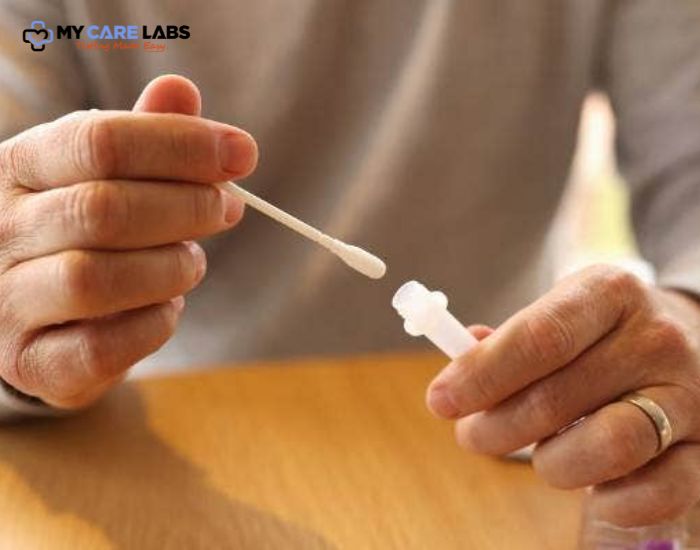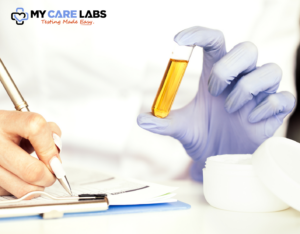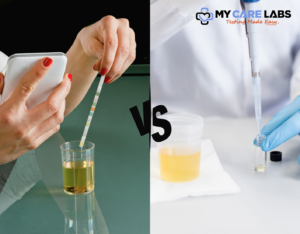In the era of global travel and the ongoing challenges posed by the COVID-19 pandemic, PCR testing has become a vital tool for individuals navigating international and domestic travel requirements. Whether it’s for business, leisure, or family visits, understanding the intricacies of PCR test for travel is crucial. This guide provides comprehensive insights into the various aspects of PCR test for travel, covering key information, testing procedures, and considerations for a smooth travel experience.
I. Understanding PCR Test: A Foundation for Travel Preparedness
A. What is PCR Testing?
Polymerase Chain Reaction (PCR) testing is a molecular diagnostic technique used to detect the presence of genetic material, specifically RNA or DNA. In the context of travel, PCR testing primarily focuses on identifying the presence of the SARS-CoV-2 virus, which causes COVID-19.
B. Why PCR Test for Travel?
PCR testing is considered the gold standard for COVID-19 detection due to its high sensitivity and accuracy. Many countries and airlines have adopted PCR testing as a requirement for entry or boarding to mitigate the risk of virus transmission.
C. Types of PCR Tests:
1. Nasopharyngeal Swab: A swab is inserted into the nostril to collect a sample from the back of the throat. A nasopharyngeal swab is a diagnostic procedure involving the collection of a sample from the back of the nasal passage and upper throat to detect respiratory infections, including viruses like COVID-19. It is a slender, flexible stick with a soft tip that is inserted through the nostril until it reaches the nasopharynx. The swab is rotated to collect a sample, which may contain virus particles if the individual is infected. This method is preferred for its sensitivity in detecting pathogens. Nasopharyngeal swabs play a crucial role in various healthcare settings, aiding in the rapid and accurate diagnosis of infectious diseases.
2. Oropharyngeal Swab: Like the nasopharyngeal swab but focuses on the throat. An oropharyngeal swab is a medical procedure involving the collection of a sample from the throat’s posterior wall. It is commonly used for diagnosing respiratory infections, such as viruses and bacteria. The swab, resembling a long cotton-tipped stick, is gently guided into the oral cavity, reaching the back of the throat. The soft tip is rotated to collect a specimen that may contain infectious agents. Oropharyngeal swabs are less invasive than nasopharyngeal swabs but are effective in detecting various pathogens. This method is valuable in clinical settings, aiding healthcare professionals in diagnosing and monitoring respiratory illnesses and facilitating timely treatment.
3. Saliva Tests: Involves collecting saliva in a sterile container for testing. Saliva tests are non-invasive diagnostic methods that analyze saliva samples for the presence of pathogens, antibodies, or other biomarkers. These tests have gained prominence, especially in the context of respiratory infections like COVID-19. To collect a sample, individuals provide a saliva specimen into a collection container, eliminating the need for uncomfortable swabs or blood draws. Saliva tests are advantageous due to their simplicity, ease of administration, and reduced discomfort compared to traditional methods. They are particularly useful for widespread screening efforts, offering a convenient option for individuals to self-administer tests at home. These tests are designed to detect viral RNA, antibodies, or antigens, providing valuable information for timely disease detection and monitoring. Saliva testing has emerged as a valuable tool in public health initiatives, contributing to the broader strategy of efficient and accessible diagnostic testing.
II. Preparing for PCR Test: Steps Before Your Journey
A. Research Destination Requirements:
Before scheduling a PCR test, thoroughly research the testing requirements of your destination. Check the accepted testing type, testing window, and any specific forms or documentation needed.
B. Approved Testing Providers:
Identify testing providers approved by your destination or airline. Most countries have a list of recognized laboratories or testing facilities. Ensure the provider you choose meets the specific criteria outlined by your destination.
C. Scheduling and Timing:
1. Appointment Scheduling: Book your test appointment well in advance. Many testing facilities require appointments, and availability can vary.
2. Testing Window: Understand the required timeframe for testing. Some destinations specify a testing window within a certain number of hours or days before departure.
D. Cost and Insurance:
1. Testing Costs: PCR testing may come with associated costs. Check the pricing structure of your chosen testing facility.
2. Insurance Coverage: Verify if your travel insurance covers the cost of PCR testing. Some insurance plans may offer partial or full coverage for testing expenses.
To find a PCR test for travel near you, consider the following options:
Local Health Departments: Check with your local health department or public health agency. They often provide information on testing locations and may offer testing services. Local health departments are government agencies responsible for public health at the community level. They play a crucial role in disease prevention, health promotion, and emergency response. These departments administer vaccinations, conduct health inspections, and collaborate with communities to address public health issues, ensuring the well-being of local populations.
Pharmacies and Retail Clinics: Many pharmacies and retail clinics offer PCR test for travel. Popular chains like CVS, Walgreens, and others provide testing services, and you can often schedule appointments online.
Urgent Care Centers: Local urgent care center’s may offer PCR test for travel purposes. Check with nearby urgent care facilities and inquire about their testing services and appointment procedures.
Testing Sites: Some areas have dedicated testing sites, often set up in collaboration with healthcare providers or government agencies. These sites may offer PCR test for travel, and you can usually find information online about locations and scheduling.
Healthcare Providers: Contact your primary healthcare provider to inquire about PCR test for travel. They can provide guidance on where to get tested and may offer testing services themselves.
Online Testing Services: Several online platforms provide at-home PCR test kits for travel purposes. These kits are mailed to you, and you send back a sample for analysis. Ensure the service is approved for travel requirements.
Before scheduling a PCR test for travel, check the specific testing requirements of your destination or airline, as regulations may vary. Additionally, make appointments in advance, as some testing locations may have high demand. Always follow public health guidelines and recommendations when seeking testing services.
III. Testing Procedures: What to Expect on Test Day
A. PCR for Test Travel Administration:
1. Nasopharyngeal or Oropharyngeal Swab: A healthcare professional will use a swab to collect a sample from your nose or throat.
2. Saliva Test: If opting for a saliva test, you’ll provide a saliva sample in a sterile container.
B. Safety Measures:
1. Infection Control: Testing facilities adhere to strict infection control measures to ensure a safe testing environment.
2. Personal Protective Equipment (PPE): You may be required to wear a mask and follow any additional safety protocols during the test.
C. Turnaround Time:
1. Fast-Track Options: Some testing facilities offer expedited processing for quicker results.
2. Average Turnaround: The typical turnaround time for PCR test for travel results ranges from a few hours to a couple of days. Consider this when planning your test relative to your departure time.
IV. Receiving Test Results: Navigating the Outcome
A. Negative Results:
1. Travel Clearance: A negative PCR test for travel result typically clears you for travel to your destination.
2. Document Retention: Save a digital and printed copy of your negative test result for presentation during travel.
B. Positive Results:
1. Isolation Protocols: If you test positive, follow the isolation and health guidelines outlined by your destination and local health authorities.
2. Contact Airlines and Accommodations: Inform your airline and accommodations about your positive result to explore options for rescheduling or refunds.
C. Traveling with Children:
1. Age Restrictions: Check for any age-related restrictions on PCR testing for children.
2. Testing Protocols: Understand the testing requirements and procedures for accompanying minors.
V. Considerations for a Smooth Travel Experience
A. Test Validity Period:
1. Testing Window: Adhere to the specified testing window outlined by your destination.
2. Connection Flights: Consider any layovers or connecting flights and ensure your test results remain valid throughout your journey.
B. Plan for Unexpected Delays:
1. Results Delay: Be prepared for potential delays in receiving your test results. Plan your testing appointment with ample buffer time.
2. Flight Rescheduling: Understand airline policies regarding flight rescheduling in case of unexpected delays.
C. Stay Informed:
1. Dynamic Regulations: Travel requirements and regulations can change. Stay informed about any updates or changes to testing protocols. Dynamic regulations refer to flexible and adaptive rules that can evolve in response to changing circumstances and emerging challenges. Unlike static regulations, which are rigid, dynamic regulations are designed to accommodate innovation and evolving situations. This approach is often seen in industries like technology and finance, where rapid advancements require regulatory frameworks to remain agile. Dynamic regulations aim to strike a balance between ensuring compliance and fostering innovation, promoting a regulatory environment that can adjust to new technologies, market dynamics, and societal needs, ultimately enhancing responsiveness and effectiveness in governing diverse and dynamic sectors of the economy.
2. Local Guidelines. Local guidelines encompass a wide range of topics, including public health measures like PCR testing. In the context of health protocols, local authorities may establish guidelines for PCR testing to monitor and control the spread of infectious diseases. These guidelines could specify testing frequency, criteria for testing eligibility, and reporting procedures. Adhering to such health-related guidelines becomes crucial in safeguarding community well-being, especially during pandemics. By incorporating PCR testing into local health protocols, authorities aim to ensure the timely identification of infections, implement effective containment measures, and collectively work towards maintaining a healthy and resilient local environment.
D. Testing Upon Arrival:
1. Destination Protocols: Some destinations may require additional testing upon arrival. Research and prepare for any post-arrival testing requirements.
2. Quarantine Guidelines: Understand the quarantine protocols at your destination, if applicable.
PCR TEST SERVICE FREMONT
- Fremont offers a range of PCR testing services to meet the diverse needs of the community. Whether you require COVID-19 testing, genetic testing, or other molecular diagnostic services, Fremont’s testing facilities provide accurate and timely results.
- In response to the ongoing pandemic, many healthcare providers in Fremont offer COVID-19 PCR testing for individuals experiencing symptoms, requiring pre-travel clearance, or as part of workplace safety protocols. These tests detect the presence of the virus’s genetic material and are crucial for controlling the spread of COVID-19.
- Beyond COVID-19, Fremont’s healthcare facilities also provide Polymerase Chain Reaction (PCR) testing for various genetic and infectious diseases. PCR is a sensitive and specific molecular technique that amplifies and detects DNA or RNA sequences. This technology is widely used for diagnosing genetic disorders, identifying pathogens, and conducting research.
- For individuals seeking PCR testing services in Fremont, it is advisable to contact local healthcare providers, testing centers, or clinics to inquire about available testing options, appointment procedures, and result turnaround times. Many healthcare providers prioritize the convenience and accessibility of PCR testing to ensure the community’s health and safety during these challenging times.
PCR TEST SERVICE CALIFORNIA
California boasts a robust network of PCR testing services, providing essential diagnostic tools for various health concerns, notably the ongoing COVID-19 pandemic. Numerous healthcare facilities, clinics, and testing centers across the state offer Polymerase Chain Reaction (PCR) tests, which are highly accurate in detecting the genetic material of viruses, including SARS-CoV-2.
Amid the COVID-19 pandemic, PCR testing in California has played a pivotal role in identifying and managing cases. These tests are crucial for diagnosing active infections, facilitating contact tracing, and ensuring public health measures are effectively implemented.
Apart from COVID-19 testing, PCR test for travel services are widely available for other diagnostic purposes, including genetic testing for hereditary conditions, infectious disease testing, and research applications. The versatility and accuracy of PCR technology make it a cornerstone in modern healthcare diagnostics.
Individuals seeking PCR test for travel services in California can explore options provided by local health departments, hospitals, clinics, and commercial testing laboratories. Many facilities offer online appointment scheduling and provide results within a specified timeframe, contributing to efficient healthcare management and preventive measures.
Whether for routine health screenings, travel requirements, or addressing specific health concerns, PCR test for travel services in California play a pivotal role in maintaining public health and ensuring timely and accurate diagnostics for individuals across the state.
In the fast-paced realm of global travel, the integration of Polymerase Chain Reaction (PCR) testing has become a cornerstone in the efforts to navigate and mitigate the impact of infectious diseases, particularly in the context of international travel. The utilization of PCR test for travel has transformed the landscape of mobility, providing a critical layer of safety and reassurance for travelers and the communities they visit. This conclusion will delve into the significance, challenges, and evolving landscape of PCR testing in the context of travel, elucidating the key aspects that shape this dynamic intersection of health and mobility.
Significance of PCR Test for Travel:
The advent of PCR testing in the travel industry represents a paradigm shift in how societies and nations approach the management of public health in a globalized world. Amidst the persistent threat of contagious diseases, the integration of PCR tests for travel has emerged as a vital tool for preemptive screening and containment. The ability to detect viral RNA with high accuracy and sensitivity positions PCR testing as a gold standard in identifying potential carriers, particularly in asymptomatic individuals.
Ensuring Safety and Confidence:
PCR test for travel instills a sense of safety and confidence among travelers and destination communities alike. By mandating pre-travel testing, authorities can identify and isolate potential carriers before they board flights or enter new regions, minimizing the risk of disease spread. This not only protects the health of travelers but also safeguards the well-being of local populations, contributing to the global fight against pandemics.
Challenges and Adaptations in PCR Test for Travel:
Despite the clear advantages, the integration of PCR testing in travel is not without challenges. Accessibility and affordability of testing, logistical issues, and varying testing requirements among different destinations pose hurdles. However, ongoing efforts to address these challenges, such as the development of rapid testing options and standardized international protocols, showcase the adaptability of the travel industry and health systems.
Evolving Regulatory Frameworks:
The regulatory landscape surrounding PCR test for travel is continually evolving. Governments and international bodies are working collaboratively to establish clear and standardized guidelines. The harmonization of these regulations is crucial for streamlining travel processes, reducing confusion, and ensuring a consistent approach across borders. The creation of unified standards facilitates smoother travel experiences, benefiting both travelers and the tourism industry.
Economic Implications:
PCR testing’s impact on the travel industry extends beyond public health considerations; it has profound economic implications. While testing requirements add a layer of cost and complexity to travel, they are instrumental in reopening borders and revitalizing tourism. Striking a balance between health precautions and economic recovery remains a delicate task, and ongoing discussions among stakeholders are essential to finding sustainable solutions.
Technological Advancements and Innovations:
The field of PCR testing is witnessing continuous advancements and innovations, contributing to the efficiency and accessibility of testing for travel. The development of rapid PCR tests, mobile testing units, and digital health passports represents a wave of innovation aimed at enhancing the travel experience while maintaining stringent health standards. These technological strides signal a promising future for a more seamless integration of PCR testing into the travel infrastructure.
Conclusion:
In conclusion, PCR test for travel has emerged as a linchpin in the global effort to reconcile the mobility of individuals with the imperative of public health. Its significance in identifying and containing infectious diseases is undeniable, and as technology and regulations evolve, PCR testing is likely to play an even more pivotal role in shaping the future of travel. While challenges persist, the adaptability of the travel industry, ongoing technological innovations, and collaborative efforts to establish standardized guidelines demonstrate a commitment to overcoming obstacles. As we navigate the complexities of a rapidly changing world, PCR testing stands as a beacon of assurance, fostering safe and responsible travel for individuals and communities worldwide.






